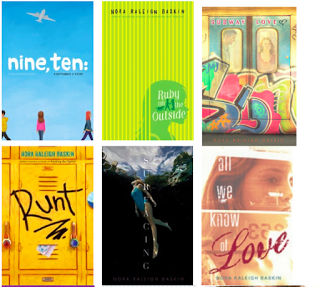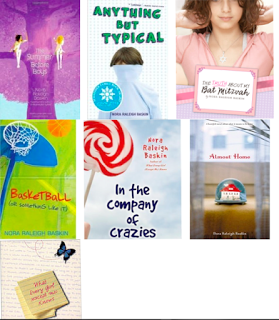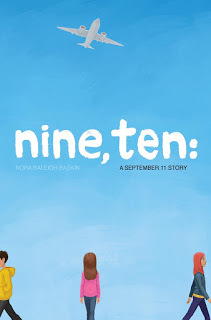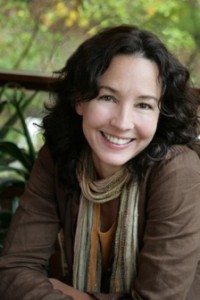Friday Feedback: First Lines with Nora Raleigh Baskin
Nora and I recently met to work on our #nerdcampMI
presentation and a few of the librarians were
ridiculously excited to know Nora was there.
Morning, shiny campers!
Or, afternoon, if you slept in -- okay, fine, or worked in!
Today, I have one of my closest friends, Nora Raleigh Baskin, here hosting, and let me just say, whether you know it or not, that was a really cool sentence I just got to type.
I mean, REALLY cool.

I only met Nora a few years back at a book event and was kind of starstruck as she was the well-known (I'd say famous, but she'd balk) author of so many beloved books, from ANYTHING BUT TYPICAL to IN THE COMPANY OF CRAZIES to RUNT.

Although we immediately hit it off, I couldn't foresee that two "9/11" books (her NINE, TEN and my forthcoming THE MEMORY OF THINGS) would bring us truly together, and make us the best (right, Nora? Best?!) of friends.
For the last several months, Nora and I have been working hard together to create a profound (we hope) school, library and general public (and upcoming #nerdcampMI!) presentation on Coping with Tragedy through a Writer's Lens, which incorporates the whys and hows of writing on 9/11, the extensive research we did to get our books right, some literary dealings, and what we hope -- and trust -- our readers will take from our stories.
We will also be sharing our many events and school visits under the #readandremember hashtag on twitter, and invite you to join us in using the hashtag if you read and love our books and want to share.
At any rate, Nora's extraordinary middle grade novel NINE, TEN: A September 11 Story was just released to two starred reviews and many other amazing accolades ! I'm so lucky and honored to work with her.

Please feel free to email either of us if you are interested in bringing our presentation (or us individually) to your school. And, if you teach middle graders, I strongly urge you to bring this stunning book into your classroom. No, really. Here you go. Right now! I also urge you to peek in on Nora's virtual launch of NINE, TEN on Facebook and share some of your own 9/11 stories. . . still postings taking place there and they are all so very moving!
So, without further ado, here's Nora with a really amazing and generous lesson on first lines.
p.s. Wonderful accompanying illustrations done by her father, Henry P. Raleigh!!!

"Your first sentence should make a promise that the rest of the story will keep"-- Francine Prose
First Lines
I often introduce this “First Lines” exercise when I am teaching kids (or adults) and I know my students don’t feel like writing very much that day. It’s a low-risk writing exercise. One line. What do you have to lose? All you have to do is write the first line of a story that you never have to finish. In fact, you aren’t suppose to finish. It’s just one teeny, weeny sentence. How hard could that be? It isn’t hard! It’s fun and easy, and the best part is how much information is hidden inside this exercise. (No, actually the best part are the amazing first lines that can arise from doing it.) In this “lesson,” I secretly implant my best advice for good writing. You can use this “first line” exercise as a jumping off/writing prompt. Or If you have a WIP, I suggest you take a look at your first sentence after you’ve read this post and see if you don’t want to rewrite your first line (or even reevaluate your first paragraph scene/chapter.) So here’s how it goes. . .
Wait, brief disclaimer: What I am about to tell you, is my opinion. These are some “rules” that I have discovered and gathered, in my sixteen years of publishing, that work for ME. But I don't have all (or, sometimes, any) answers. And, remember, I NEVER think about the things I am about to talk about WHILE I am writing. Some is done in the pre-writing stage and most, during revision. Meaning, just write, and think about all of this again LATER. Okay, here goes (again): There are really only three types of sentences, so hence only three ways you can start your story. They are: *Description : It was a cold and stormy night *Dialogue : “I like you,” the boy said. This includes sounds: Bang! Pop! Watch out! And the ever-popular: Crash! *Narration: The boy and girl walked down the street.
Now, I can begin a new book without knowing the ending (I NEVER know the ending), without having any kind of outline, without even knowing all my characters, or their exact characteristics and my first sentence will always be either, dialogue, description, or narration. BUT I cannot start a story without knowing these three things:P.O.V
ToneSetting These three things should all be included in your first sentence.(though not necessarily visibly) Let’s break them down. P.O.V Point of View. Again, only a few choices here: First, second, or third (close or omniscient.) Most people know these, but many forget to consider from what point in time the narrator is telling their story. Present tense is pretty self explanatory, but past can be trickier. Is this narrator telling this story from a distance? Two days. Two years? Or just a few seconds? Past tense has the magical suspension of disbelief, that although everything taking place has alreadyhappened, the narrator doesn’t know what is coming. And most importantly. . . Whyare they telling this story? Why are they telling it NOW, at this point in time? Your first sentence will hold this information, either directly or subliminally.
Tone: I like to think of this as, What kind of TV show did I just put on? Law and Order? Glee? The Brady Bunch? Or Dark Shadows? I’m dating myself, but you get the idea. You need to have a very firm idea about what KIND of story you want to write. For me, when I wrote my first book, I knew I wanted it to be poignant but humorous. Humorous but poignant. (I was completely inspired by Ruth White’s Belle Prater’s Boy.) You don’t want to change your mind about tone mid-way through writing. And you don’t want to be wishy-washy about it either. Tone will inform every scene, every word choice, every character decision, the beginning, middle, and end. It is the music and lighting of your story. It is the way your reader will know what kind of TV show they’ve just just put on.
Setting: Setting. Setting. Setting. For some reason, new writers often forget how important this is. I mean, they think they’ve know the setting, but often, not well enough. KNOW your setting, know everything about it. Not just whether your book is set in the country or city, but the economics of that town. Know, not only that your character is in middle school, but how large the school is. What is the demographics. The landscape. Know, the country, the exact state (you can make up towns, but not the state!) the town, and the street. The more specific the better, even if none of it ever shows up in your text. It will be relevant to your characters and every aspect of your story. So don’t gloss over setting. (p.s. If you write fantasy, knowing your setting is, of course, even more important because there will be no common context for your readers. You will need to have every detail ironed out and consistent.)
Once you have these three things settled, it’s safe to start driving.
Writing your first draft is like driving in the dark. A revision is driving with the lights on. But we are getting ahead of ourselves. I want to share a few hints/rules that should help you with your first line (and the rest of your story.)
One: Begin your story at a point at which something has happened or is about to happen.
Kurt Vonnegut says, enter a scene as late as possible and get out as early as you can. In other words, don't start at the beginning. You don't have front-load all information. There are many other ways to reveal backstory, using dialogue and flashbacks. Or maybe you don’t even need it.
Two: Details not adjectives will make your writing better. Be as specific as possible. And it’s
salient details not just every details. What you chose to show is like a camera close-up. The viewer/reader will see it as important. Don’t show EVERYTHING.
Three: When you write that first sentence ask yourself this: Can I draw a picture of it? The first sentences that stay in your mind, the ones that make the biggest impact, and draw the reader in the best, are visual. You can see them. Remember them. Draw a picture of them.
*Take a risk. Stand naked and write boldly.* Four: And lastly, take a risk. Stand naked and write boldly. Write from your heart (always my advice!) If you have a passion about something, go for it. Don’t hold back.
That first sentence can be long or short, complicated or simple.
Louis Sachar-Holes: “There is no lake at Camp Green Lake.”
Cynthia Rylant- Missing May: “When May died, Ob came back to the trailer, got out of his good suit and into his regular clothes, then went and sat in the Chevy for the rest of the night.”
It may or may not reveal the point of view.
Anne Brashares- The sisterhood of the Traveling Pants: Once upon a time there was a pair of pants. Ruth White- Belle Prater’s Boy: Around 5:00 a.m. on a warm Sunday morning in October 1953, my Aunt Belle left her bed and vanished from the face of the earth.
It might hit you over the head with tone, or be more subtle.
William Steig- Solomon and the Rusty Nail: “Solomon was an ordinary rabbit, except for one thing: anytime he wanted to, he could turn into a rusty nail.”
E. B. White- Charlotte’s Web: “Where’s Papa going with that ax?” said Fern to her mother as they were setting the table for breakfast.
But look how much you know from each of these examples! Look carefully. They are packed with information. They are unforgettable first sentences. But don’t take this too literally, if your first sentence doesn’t turn out to be a knock out, don’t make yourself crazy. Just make sure your first paragraph, first scene, first chapter is. First lines is a metaphor for that promise you are making your reader that the rest of your story needs to keep.
Having said that, I'm not sure of this first line yet from one of my works in progress. What are your thoughts on it, and the shared excerpt (as per the Friday Feedback RULES): What works? What doesn't? Does the piece compel you to keep reading?
Chapter One
“Well, what did you expect?” Cat was asking. “That he’d stop dead in his tracks and say, ‘Hey aren’t you the girl I locked eyes with for a total of three--no, probably more like two seconds--a year and a half ago? Oh my god, I’ve been looking everywhere for you.’”
Grace shrugged. She was used to this, people not understanding her, even, sometimes, Cat, her best friend. For quite a while now, Grace suspected that other people didn’t have the same commentary constantly running through their head, mostly self-critical, often times, half a click away from panic.
You can be pretty intense sometimes, Grace, Cat would tell her. Cat would try to explain, not everybody thinks about everything the way you do. They don’t all feel the same way about things. They don’t all look for the drama like you do.
Or get hurt as easily.
Or absorb blame so readily.
And it was pretty crazy, Grace had to admit. To be thinking about a boy she didn’t know and had made up fantastical stories about for all these months; about how she would bump into him. Ways they could meet. About when Luke would kiss her the first time, and how amazing that would be.
She had a mad crush on someone who resided completely in her head. Luke hadn’t rejected her in the hall; she had set herself up. It was like being in love with a movie star, with someone you can never have. Someone who doesn’t want you. Grace seemed to have a penchant for that kind of love; Wanted but not wanted, loved but not loved enough. It was a dance she had learned a long time ago, steps she had taught herself, because she had to.
Now it’s your turn. One line or the first few paragraphs. Stand naked. Take a risk. Let your freak flag fly. Let the games begin.
- Nora (and Gae)
(p.s. My guest authors work hard ALL day and sometimes ALL weekend. So please check out NINE, TEN and all of Nora's amazing books!
Published on July 08, 2016 03:11
No comments have been added yet.



